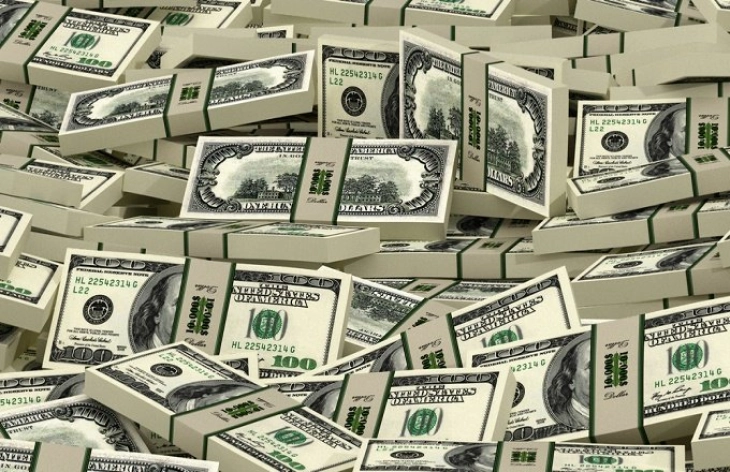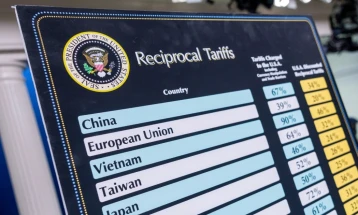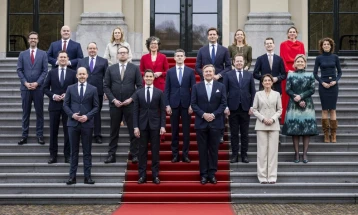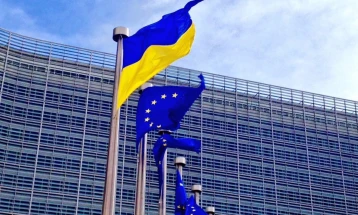EU backs G7's Russian asset-backed $50 billion loan for Ukraine
- The Council of the European Union has approved plans for new, multi-billion-euro loans to Ukraine, backed by frozen Russian assets, shortly after a breakthrough in negotiations with the United States.

Washington, 24 October 2024 (dpa/MIA) - The Council of the European Union has approved plans for new, multi-billion-euro loans to Ukraine, backed by frozen Russian assets, shortly after a breakthrough in negotiations with the United States.
The adopted legal texts stipulate that profits stemming from Russian sovereign assets frozen in the EU should be used for the loans, which are being provided by the Group of Seven (G7) industrialized nations.
Earlier, a US government representative said the G7 agreed to the loans amounting to $50 billion. The money will be transferred to Ukraine in the form of financial aid, the EU council said late on Wednesday.
Under the sanctions imposed by the EU on Russia, approximately €210 billion ($226 billion) in assets belonging to the Russian central bank has been frozen since February 2022. The extraordinary interest earnings from these assets are currently estimated to be up to €2.5 billion to €3 billion per year. The majority of these assets are in the EU.
Tough negotiations over loan plan
Negotiations over the deal, with so many nations involved, were extremely complex, and it was initially unclear how much the United States would contribute.
Shortly before the EU decision, the US announced that it would contribute $20 billion to a $50 billion loan package from the G7, which includes Britain, Germany, France, Italy, Japan and Canada in addition to the US.
The EU had previously announced that its maximum contribution would be €35 billion, although German Finance Minister Christian Lindner said the EU initially planned to contribute approximately $20 billion.
Now with the US contribution of $20 billion, the EU has committed to about the same with the remaining $10 billion to be covered by Britain, Japan and Canada.
According to statements made on Wednesday evening, the EU loan is to be made available to Ukraine before the end of the year and have a maximum duration of 45 years.
The agreement stems from a plan that the G7 states and EU representatives agreed upon at a summit in June. However, there were still some obstacles to overcome in the negotiations, particularly regarding the EU sanctions rules.
"While we have found a way to move forward without legal changes the EU sanctions regime, we will keep pushing for those changes to get made," the US government representative said.
"The Europeans have equal skin in the game and therefore fully aligned incentives to keep the assets immobilized" until full repayment, the representative added.
The devil is in the detail
Should Moscow regain access to the frozen funds in the EU before the loans are fully repaid, the EU and the other participating G7 partners would have to take over the repayment. This could happen, for example, if an EU state were to block the extension of sanctions on Russia with a veto.
Therefore, Washington called for a change in the EU sanctions rules from Brussels to have more security so the Russian funds intended for loan repayment remain frozen.
Currently, the EU decision to freeze the assets must be unanimously extended every six months. The US is pushing for this period to be extended to three years. However, Hungary is currently refusing to give the necessary approval.
"Yes, there's grandstanding and drama, but the EU has built a track record of staying the course, and that adds to our confidence that Russia's sovereign assets will remain immobilized until Russia ends its war and pays for the damages it's caused," the US government representative said.
Zelensky thanks allies
Ukrainian President Volodymyr Zelensky thanked Western allies for the latest military aid.
The $50 billion loan from the G7 will help Ukraine in its defence and resilience, he said in his evening video message, broadcast in Kiev.
Zelensky said the aid must be paid this year to help Ukraine as it seeks to fend off Russian attacks, in a war that began nearly 1,000 days ago.
Meanwhile, Russian President Vladimir Putin has highlighted the successes of his army in the war against Ukraine at the BRICS summit of emerging industrial nations in Kazan.
Ukraine has been defending itself against a full-scale Russian invasion for over two and a half years. Putin had already sharply criticized the proposed loan for Ukraine some time ago, calling it robbery. He warned that the G7's decision "will not go unpunished."







